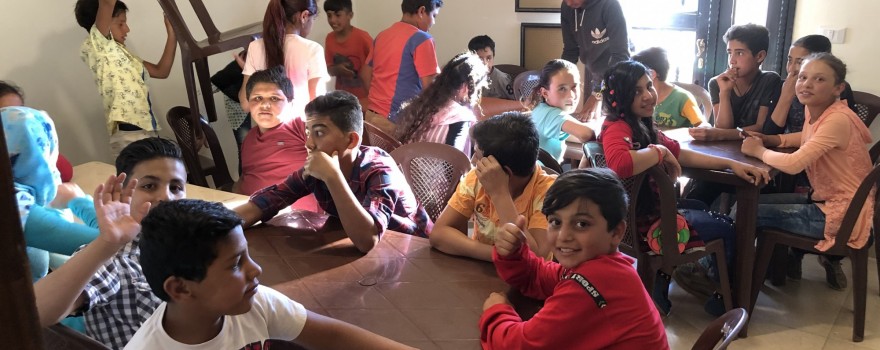An anecdote of a young war victim
Hoofdafbeelding

The last two days, victims of crisis situations worldwide have taken the center stage in The Hague at the 'International Conference on Mental Health and Psychosocial Support in Crisis Situations'. The focus has for too long been on physical damage and reconstruction, overshadowing psychosocial support. The past weeks, EMMA's Laura Sofie van der Reijden and researcher Marije Luitjens were in Lebanon to research just this; how does psychosocial support help children? An anecdote of a young victim of war.
Sitting in a chair that's too big for him, Ahmed* (9) interprets the question wrong. What is his biggest dream? He looks at the researchers questioningly. Then he tells a short story to Alaa Kaddoura, the Child Protection Program Manager at URDA Lebanon. At a certain point, Ahmed wraps his small hands around his neck while speaking.
Listening to Ahmed, Alaa's expression changes. 'He says he dreams about a man from the camp trying to kill him', Alaa translates. 'That's what he was trying to show with his hands, someone strangling him.' Alaa immediately asks him more questions: do you know the man? No. Has he ever touched you? No. Are you afraid of him? Yes. Why are you afraid? Ahmed says: 'The man is dressed in all black'. That reminds him of the scary men back home in Aleppo, Syria.
Nowhere to go
Ahmed now lives in an URDA-provided refugee camp in Arsal, in the northeastern Bekaa Valley in Lebanon. Arsal is one of those places where you'd rather not be; nothing but sand and stones in the summer, and overrun with snow and rain in the winter. It's situated 15 kilometers from the Syrian border, so a lot of refugees strand in the small town. Not built on this people influx, Arsal became 'home' to many refugees, most of whom are unable to leave the army supervised and closed off zone. The whole Bekaa Valley hosts more than 340.000 refugees, out of almost 1 million in the whole country.
Ahmed's been in Arsal for 2 years now. Before that, he lived with his parents, 4 brothers and 2 sisters in a house in the Bekaa Valley. He left Aleppo at a young age. In the camp, he has 3 good friends. But he doesn't like being here that much. Most of the other kids annoy him; they pick physical fights and are mean. But they do play sometimes until nightfall.
In the URDA-program Ahmed goes to, he learns English, math and Arabic. He can't go to a school in the area, so these subjects are his weekly occupancy. He spends the rest of his time at his family's tent or outside.
Ahmed says he is not really happy. He has the feeling other children talk about him in a bad way. And he wants to go to school. When he tells his father about the man in black that he fears for, his father tells him not to worry about it. Ahmed hopes he won't be scared in the future.
Psychosocial support
Relief associations like UNICEF and War Child provide shelter and care for refugees in Lebanon. Part of the non-formal school and education projects for children contain 'PSS': psychosocial support. According to War Child, their PSS interventions are designed 'to enable children and young people to develop their resilience and innate strengths. Participants in our life-skills interventions and structured recreational activities develop increased self-confidence and trust in others.' In the case of Ahmed, Alaa transferred him to case management as a 'high risk' case. His story will be looked at more closely in the near future.
The research on PSS and education in Lebanon conducted by Laura Sofie van der Reijden and Marije Luitjens will conclude in a policy report for the Dutch Ministry of Foreign Affairs in January 2020.
*Ahmed's name is fictitious, to protect his identity.